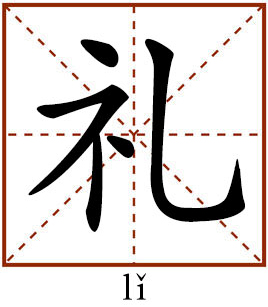Rites

When used as a verb, this character means "to worship gods" or "to treat someone courteously." When used as a noun, li refers to rites, courtesy, etiquette, or gifts.
礼贤下士
lǐ xián xià shì
Li means "to respect" and xia "stay modest and show courtesy." Xian refers to a person who practices integrity and shi scholars. This term often indicates that one should treat the people who are virtuous and wise with respect.
This term depicts a character trait that was highly valued in ancient China. It was believed that rulers should respect and show courtesy to all the people who were virtuous and wise, so that these people would be willing to serve them. There are many examples of this concept in Chinese history. A famous legend is known as "Three Visits to a Thatched Cottage," which happened in the Three Kingdoms period (220–280). Liu Bei (161–223) was a warlord in the late Eastern Han Dynasty and Zhuge Liang (181–234) was a great Chinese politician and military strategist. In 207, on hearing of Zhuge’s exceptional talent, Liu Bei came three times to visit Zhuge in his wilderness retreat before Zhuge agreed to become Liu’s advisor. Zhuge helped Liu Bei to organize his forces and establish the Shu-Han Dynasty.
仓廪实而知礼节
cāng lǐn shí ér zhī lǐ jié
Cang lin refers to granaries. Shi means "to be full." Zhi means "to understand.”" Lijie refers to appropriate rules of conduct.
This term is derived from Guanzi, an ancient political and philosophical text. This term views the notion of li from a distinctive perspective. The full quote from Guanzi reads: "When the granaries are full, people follow appropriate rules of conduct, and when there is enough to eat and wear, people know honor and shame." Here "granaries" and "eat and wear" mean the material conditions of life, while "rules of conduct" and "honor and shame" represent the social and moral principles of a society. The quote highlights the relationship between material life and morality. The former is the basis for the latter, and that morality and social norms are the product of a certain degree of material development. This is a very practical concept for state governance.
Edited by REN GUANHONG
